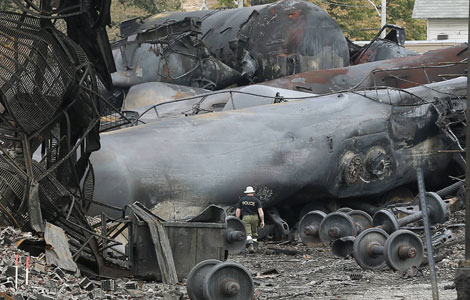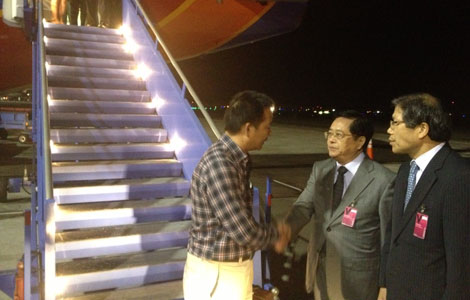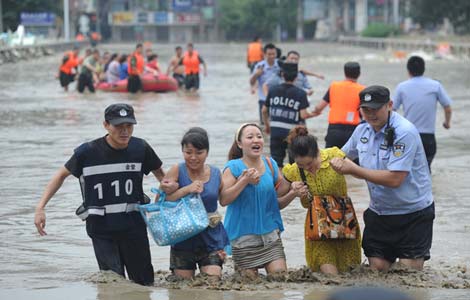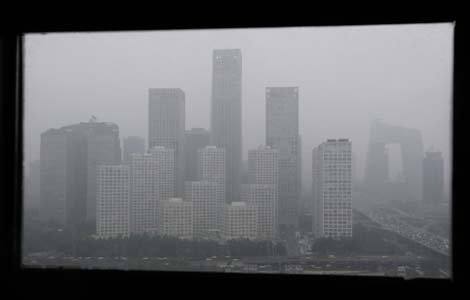Summer smog will become common, experts say
Updated: 2013-07-10 08:06
By Wang Qian (China Daily)
|
||||||||
The spell of thick smog that blanketed Tian'anmen Square for 18 days in June will not be a thing of the past, according to weather experts.
Yan Peng, an atmospheric chemistry researcher of the Meteorological Observation Center of the China Meteorological Administration, and other researchers said the smog this summer may become a common occurrence if the high humidity remains steady.
"High humidity may cause low visibility, worsening smog," Yan said.
Smog, he said, is more common in the summer than in the winter and autumn seasons, citing CMA observations over the past 10 years.
According to the CMA, the number of smoggy days per month in Beijing soared from July to August. Over the past decade, each month had an average of about 15 days of smog.
He said smog depends on the concentration and properties of aerosols, microscopic particles that scatter or absorb light, in the atmosphere.
"It means in a winter day with particulate matter 2.5 at 100 micrograms per cubic meter and some relative humidity, smog may not form, but if it happens in the summer, heavy smog may form due to the high hygroscopic (moisture absorbing) growth of aerosols in the summer," Yan said.
Particulate matter is usually characterized by size because of the different health effects associated with its size. Particulates that measure 2.5 micrometers are mostly caused by fuel combustion and can be inhaled into the lungs, causing harm to one's health.
The brownish smog in late June, Yan said, had PM 2.5 readings reaching nearly 300 micrograms per cubic meter, creating very low visibility.
"But the summer smog doesn't mean air pollution is worsening," Yan said, explaining that the city's pollutants - a mix of industrial discharge, vehicle exhaust and construction dust - have been increasing for decades.
"The composition of aerosol samples taken for the past few decades shows that in the recent years, particulate nitrate has been increasing, which may come from vehicle exhaust," Yan said.
Wang Yuesi, a researcher at the Institute of Atmospheric Physics under the Chinese Academy of Sciences, recently told Beijing News that vehicle exhaust and the burning of coal are the main contributors to the capital's smog.
Wang Yaqiang, deputy director of the atmospheric composition institute at the Chinese Academy of Meteorological Sciences, said in recent interviews that the only way to reduce the number of smoggy days is to control emissions.
Yan agreed, adding that the smog will significantly decrease once pollutants are reduced dramatically.
"It was proved during the Beijing Olympic Games in 2008," he said.
During the 2008 Games, Beijing authorities kept millions of cars off the roads and halted some construction and factory production near the capital.
Last year, there were 5.2 million vehicles in the capital of nearly 21 million, according to the Beijing environment report in 2012 released in late May by the Beijing environmental protection bureau.
The worsening pollution since winter has triggered public concern over the city's air quality and its health impact. Authorities have responded by putting a greater effort to tackle the problem.
In June, the State Council adopted 10 new measures to curb air pollution, including speeding up the installation of pollution control equipment on coal-fired refineries and restraining the growth of industries that use a high amount of energy. It is also aiming to reduce emissions per unit of gross domestic product by at least 30 percent in heavy polluting industries by 2017.
wangqian@chinadaily.com.cn
(China Daily USA 07/10/2013 page4)

 Thousands pay final tribute to US firemen
Thousands pay final tribute to US firemen
 Dozens feared dead in Quebec derailment
Dozens feared dead in Quebec derailment
 Breathe deep, this is the real thing
Breathe deep, this is the real thing
 Families of crash victims in SF
Families of crash victims in SF
 Rainstorms cause severe flooding and landslides
Rainstorms cause severe flooding and landslides
 Coal burning in China's north can shorten lives
Coal burning in China's north can shorten lives
 Some solar companies see brighter first half
Some solar companies see brighter first half
 Thousands flock to Texas Capitol over abortion
Thousands flock to Texas Capitol over abortion
Most Viewed
Editor's Picks

|

|

|

|

|

|
Today's Top News
Watchdog: Trans-fat levels meet standards
Most passengers on crashed plane reported safe
China, US hold talks on cybersecurity
Shenzhen Red Cross denies organ claim
Rainstorms cause severe flooding and landslides
Japan tags China as 'security threat'
Honesty is a challenge for CPC
Snowden hasn't accepted asylum
US Weekly

|

|







